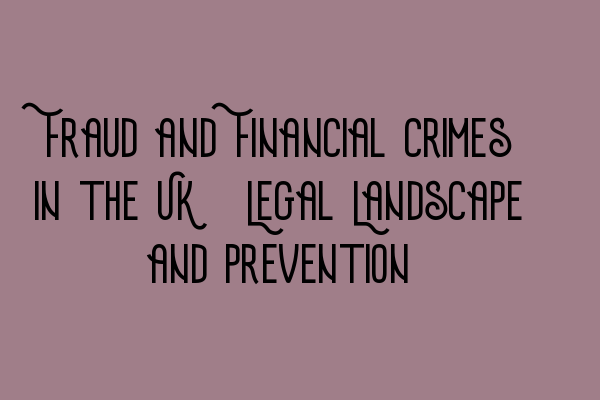Fraud and Financial Crimes in the UK: Legal Landscape and Prevention
Welcome to the SQE Criminal Law & Practice Law UK blog, where we provide expert insights on various legal matters. In this article, we will discuss the legal landscape of fraud and financial crimes in the UK and offer valuable advice on prevention strategies. It is essential for individuals and businesses to stay informed about these issues and take proactive measures to safeguard their finances and reputation.
The Scope of Fraud and Financial Crimes
Fraud and financial crimes encompass a wide range of illegal activities that involve deception, misrepresentation, or manipulation of financial transactions. Examples of such crimes include:
- Mortgage fraud: This crime involves providing false information or documents to secure a mortgage loan.
- Identity theft: Criminals steal personal information to impersonate individuals and conduct fraudulent transactions in their name.
- Insider trading: Illegally trading stocks based on non-public information.
- Money laundering: Concealing the origins of illegally obtained funds to make them appear legitimate.
- Ponzi schemes: Fraudulent investment schemes where new investors’ funds are used to pay returns to earlier investors.
Understanding the Legal Landscape
In the United Kingdom, fraud and financial crimes are taken very seriously and are subject to robust legislation. The Fraud Act 2006, along with other relevant statutes, sets out the legal framework to prosecute offenders. It is vital for individuals and businesses to be aware of the potential consequences of engaging in such activities.
Working with experienced criminal law solicitors is crucial to navigate the complexities of fraud and financial crimes cases. If you find yourself faced with allegations or require legal representation, contact our team at SQE Criminal Law & Practice Law UK. We provide expert advice and support to help safeguard your interests.
Prevention Strategies
Preventing fraud and financial crimes is paramount to mitigate risks and protect your financial well-being. Here are some effective prevention strategies:
- Implement robust internal controls: Establishing internal control mechanisms within your organization can help detect and prevent fraudulent activities.
- Train employees: Educate your staff about potential red flags, such as suspicious financial transactions or requests for sensitive information.
- Regularly review financial statements: Analyze and scrutinize financial records to identify any irregularities or discrepancies.
- Use secure technology: Employ robust cybersecurity measures to protect sensitive data and prevent unauthorized access.
- Stay informed: Keep up to date with the latest fraud trends and prevention techniques by reading reputable sources and staying connected with legal professionals.
By implementing these strategies, you can decrease the likelihood of falling victim to fraud or financial crimes and enhance the overall security of your organization.
Conclusion
Fraud and financial crimes pose significant threats to individuals and businesses alike. Understanding the legal landscape and taking proactive measures to prevent such activities are crucial steps towards safeguarding your interests.
For expert legal advice or representation in fraud and financial crimes cases, turn to the knowledgeable solicitors at SQE Criminal Law & Practice Law UK. Contact us today for a consultation and let us guide you through the complexities of the legal system.
Related Articles:
- Legal Representation for Delaware LLCs in the UK: Expert Advice
- Ensuring Ethical Business Practices: Delaware’s Code of Conduct
- Legal Challenges for UK Businesses in the U.S.: Strategies for Overcoming Hurdles
- UK Criminal Law: An In-Depth Analysis of the British Legal System
- Legal Challenges for UK Businesses in the U.S.: Strategies for Overcoming Hurdles
